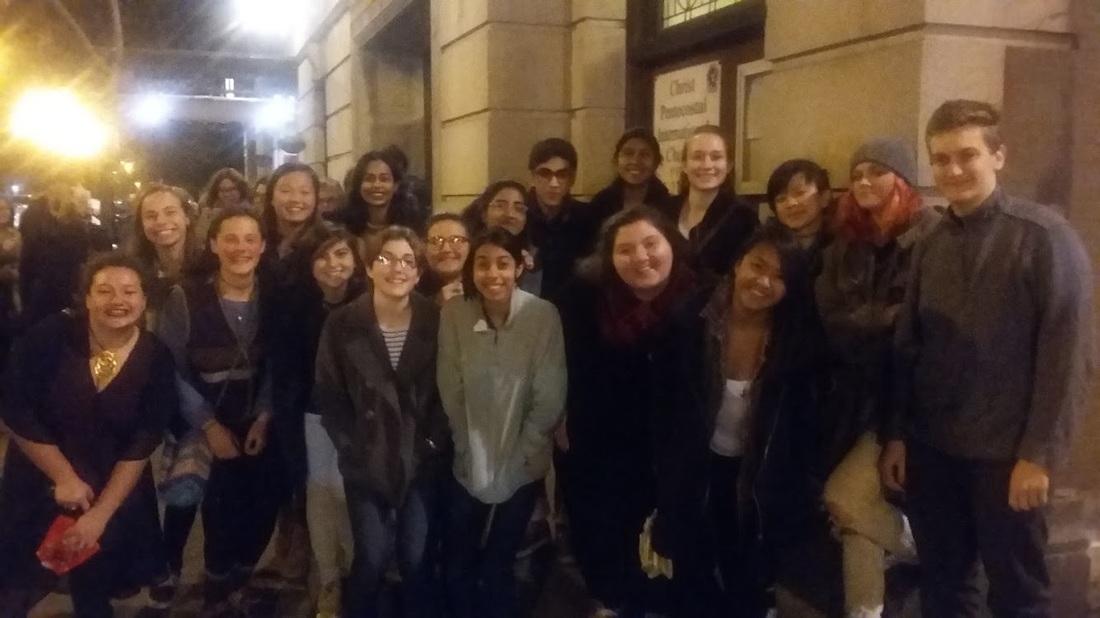I’ll go out on somewhat of a limb here and argue that Fun Home is the ultimate feminist musical. Is it because the main character is a woman, one may ask, or because, perhaps, she is a queer woman? And to both of those questions I must respond that while those are important facets of the musical, a feminist musical they do not make. Fun Home is ultimately feminist in its portrayal of characters who are dimensional and real in ways that women typically are not in popular culture.
Fun Home tells the experience of Alison Bechdel, at 46 years old, as she writes a graphic memoir of the same title. Bechdel’s focus, throughout the memoir, is her relationship with her dad, a closeted gay man who committed suicide when Alison was in college. This theme is actually summed up pretty well at the end of the opening number in a line that goes “Caption: My father and I both grew up in the same small Pennsylvania town, and he was gay and I was gay, and he killed himself. And I became a lesbian cartoonist” As shocking and depressing as this sounds, the musical and graphic novel, are actually hilarious at times to balance out the heavy themes of the memoir.
From the beginning of the musical, it is clear that Bruce (her father) is not perfect. He doesn’t even come close. Still, Alison finds herself needing him at different points in her life, because relationships are not as simple as comic book superheroes and villains make them out to be. In Fun Home, there is no “bad guy” to point fingers at, and there’s definitely no savior to idolize by the end. It is revealed later that Bruce spent his entire marriage to Alison’s mother, Helen, cheating on her with various men, and at times, verbally abusing her. Alison, discovering all of this for herself, in no way approves of her father’s treatment of her mother and still needs and treasures a relationship with her father, because keeping up a relationship with someone is entirely separate from your evaluation of their wrongdoings. Alison, having recently come out, craves the understanding and shared experience from her father, a fellow queer person whom she’s known her whole life on an entirely different level. Still, she recognizes that he is not a warm and loving person which she explains saying, “sometimes my father appeared to enjoy having children, but the real object of his affection was his house.” The entire musical really does center on Alison’s adult self’s grappling with her memory of her dad.
People have brought up, and it’s fair to note, that Alison’s mother, Helen, is, as mothers in film and theatre usually are, stagnant. It is true that she remains in a marriage that is far past unhappy for years and doesn’t interact much with Alison overall, but she is not the weak mother so many disney-like mothers are. She is not dead and she doesn’t go away. She grapples with her own situation as Alison does and eventually lets Alison know. In her big song, “Days and Days,” she explains that it wasn’t a decision to stay for her children or for love of her husband, but an existence she struggled to face head on and thus was consumed by it. Helen, while not warm herself, is not seen as a villain. On the contrary, it makes her more real. She is not the doting mother our culture loves to paint, or the cruel one we love to demonize, she lives day by day with her family and struggles to hold up the house of cards. She is a person.
Alison Bechdel does a beautiful job of telling it as it is. This story of a broken family is as far from typical as this label would imply. Fun Home is a story that is relatable beyond measure, regardless of whether or not we grew up in a family with a closeted father and distant mother and a funeral home as a family business, shortened by the family to fun home. Fun Home is ironic and beautiful and complex and unsolvable. It holds back no secrets and cuts a jagged line into the well maintained home that seems so untouched by pain. It tells the truth.
Categories:
Sahar Steiner: “Fun Home” musical analysis
December 28, 2015

0
More to Discover









